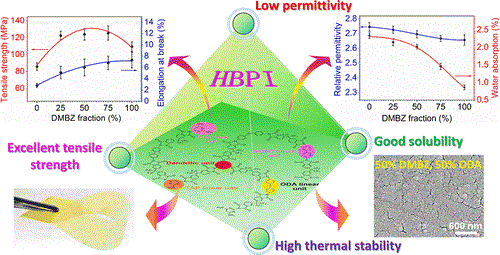【J. Phys. Chem. C】Tunable Permittivity in High–Performance Hyperbranched Polyimide Films by Adjusting Backbone Rigidity
writer:Xingfeng Lei, Mingtao Qiao, Lidong Tian, Yanhui Chen,* and Qiuyu Zhang*
keywords:Na
source:期刊
specific source:http://pubs.acs.org/doi/abs/10.1021/acs.jpcc.5b11667
Issue time:2016年

Currently, low-dielectric polyimides (PIs) such as fluorinated or porous PIs exhibit a low-dielectric property but have undesirable mechanical and/or thermal properties. Therefore, it is crucial to find a more considerate method that could lower the permittivity, while maintaining or improving the mechanical and thermal properties. Herein, a series of hyperbranched (HB) PI films were synthesized by adjusting the content of the rigid diamine, 2,2′-dimethylbenzidine (DMBZ). The dielectric properties of the HBPIs were accordingly tuned, that is, the permittivity of the resulting HBPIs decreased with increasing the DMBZ fraction owing to the enlarged free volume and the hindered dipole orientations afforded by the rigid DMBZ. The maximum mechanical strength of the resulting HBPIs located at the formulation made using 50% DMBZ and 50% ODA. At this formulation, the optimal comprehensive performances were achieved, that is, excellent tensile strength (124.1 MPa), desirable thermal stability (5% weight loss temperature up to 505 °C with weight residual of 56.7% at 800 °C under argon), high glass-transition temperature (324 °C), low relative permittivity (2.69, 1 MHz), reduced water absorption (~1.86%), and good solubility. Our approach provides a new idea to fabricate low-dielectric PIs with good mechanical and thermal properties.